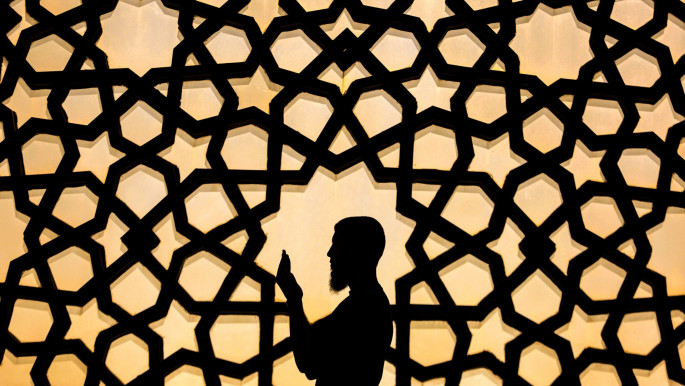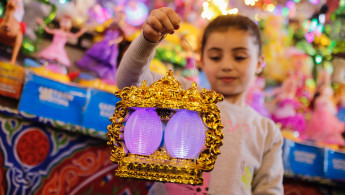Ramadan, kids and quarantine - a survival guide
Like most Muslim families across the world my husband, children and I are avoiding big Iftar gatherings and mosques this year. Instead we have a more somber Iftar, while the children sleep.
And although the nights are a lot quieter, the same can't be said for the days, which now seem to stretch on forever.
With two young children under the age of three, sleeping in after a night of prayers and Suhoor, is impossible. On a good day I manage to snooze until 7am.
Much to my dismay, the children are full of exuberance and excitement early in the morning, hungry for breakfast and play. According to studies the early hours are when children absorb the most information, so I try to use this time to 'homeschool'.
By 8am we've finished an episode of Paw Patrol, completed some sort of messy craft activity, and eaten 2-3 breakfasts (them, not me). Needless to say, I'm exhausted before the day has even begun and still have 12+ hours left before I can break my fast.
 |
Most parents in quarantine with their children are finding it increasingly hard to keep them entertained while fitting in work, cooking, prayers and extra acts of worship during Ramadan |  |
And it's not just me. Most parents who are now in quarantine with their children are finding it increasingly hard to keep them entertained while fitting in work, cooking, prayers and extra acts of worship that are encouraged during this month.
Hana, 33, from London is homeschooling her two children, while juggling working from home and preparing the Iftar meal in the evenings. "As a single mum I don't have the option of sharing the childcare and chores," she told The New Arab.
"I make it work by catching up with emails and work after my Suhoor in the early hours and after breaking my fast in the late evenings. It's tiring, but what choice do I have? Luckily my employer is understanding and has allowed me some flexibility."
 |
|
| Read more: Growing closer to God during Ramadan under lockdown |
And although there is some comfort to be taken knowing that I'm not alone in my despair it doesn't make it easier, nor is a normal, busy schedule sustainable for an entire month. So how can you achieve a better balance between kids, quarantine and fasting? Here are some tips to help you.
Have a schedule - but be flexible
I spent the first few days of Ramadan in survival-mode, just trying to get through the day. But this haphazard approach didn't work. I was throwing the iPad at the kids to meet deadlines, leaving the television on for hours at a time and letting them snack erratically, just to get by. The entire household fell into disarray.
Children thrive on routines and when that goes out the window it can make them misbehave, so I devised a schedule. It doesn't need to be rigid and a lot of it will depend on the age of your children, but by setting times in the day for specific activities it will make the day go a little smoother.
For instance, I tend to do a bigger clean before Iftar, once playtime is over. That way I'm not constantly tidying and picking up after the kids. My children are also young enough to still nap in the day so after their lunch I send them up for 'quiet play' which involves reading, lying down and, with any luck, a nap.
Keep activities simple
Shamima, 28, a mum of two, spent over £100 on children's activities and craft kits only to find that it wasn't keeping her kids engaged for long enough. "It was a complete waste of money because they would complete a craft within 15 minutes and want to do another one" she explains. "None of the activities lasted longer than half an hour and the mess, stress and tears at the end was just not worth it."
 |
Don't put too much pressure on yourself this month. We are in a unique circumstance and for many of us just getting through the day can be a huge accomplishment |  |
Remember, children have short attention spans. Instead of setting up activities with elaborate rules and guidelines, allow them to take more of a lead in their play. My three-year-old entertained himself for an hour with an empty water bottle, stick and some pennies the other day. You just need to be creative. Take them out on walks to tire them out and if you have a garden get them to plant and water seeds.
Get them involved
Instead of thinking of your children as mini assailants on a mission to thwart your work and chores, get them on-side and involved. Life skills are somewhat lacking in the school curriculum so use this unique time at home to teach your children skills such as tidying, laundry, washing up, folding clothes and putting things away.
Another way to encourage them to pick up after themselves or help out with the Iftar preparations is to turn it into a game. I put a timer on the television and get them to complete a task as quickly as possible.
 |
|
| Read more: How coronavirus has changed the way Muslims celebrate Ramadan |
This might also be the only Ramadan that they continuously spend at home so use the time to educate them on the meaning of this month and how they can benefit from it by learning new prayers.
Work in shift patterns
In households where both parents are at home with the children try splitting the childcare up so that you both get adequate rest and time for worship. Without the additional help of grandparents and extended family it can be hard and intense to be the sole caregiver for your children. Try enforcing an earlier bedtime so that you have more time in the evenings to break your fast and pray.
Take it easy
Finally, don't put too much pressure on yourself this month. We are in a unique circumstance and for many of us just getting through the day can be a huge accomplishment. Remember, this is also a difficult and stressful time for children who have a lot more energy to burn than their fasting parent does.
It can be easy to get carried away and try to make elaborate decorations and Iftars, especially when parents post photos of all the amazing things they've done on social media. Lanterns and bunting are great - but it doesn't make you a better parent. Everyone's situation is different and unique.
Schedule quality one-on-one time with each of your children, even if it is just fifteen minutes of reading before bed. This will have a longer lasting and more positive impact on them than an 'Instagramable' home or fancy meal.
Sami Rahman is a freelance lifestyle writer based in London.
Follow her on Twitter: @bysamirahman



